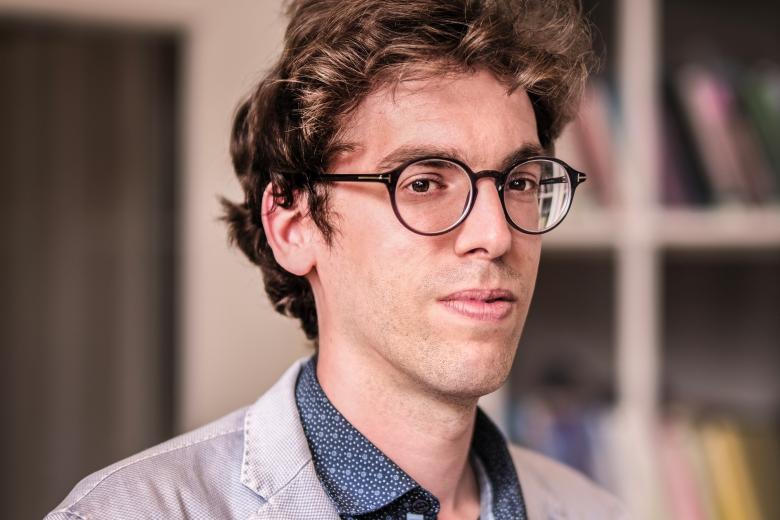Islamic feminist in Maastricht academia
Feminism can no longer be defined as the traditional movement of the white, heterosexual middle class. Just as black feminists brought race to the fore, Islamic feminists introduced religion into the discourse. At Maastricht University assistant professor Lana Sirri critically examines feminism at the intersection of gender and religion, including aspects such as race, sexuality and ethnicity. “The values that all feminists are struggling for can be interpreted differently by different feminists in different locations and contexts.”
Sirri is a Palestinian and a Muslim who grew up in Israel. After spending several years as a women’s project coordinator at the Arab Jewish Community Centre in Jaffa-Tel-Aviv, she decided she wanted to study the bigger picture of the situation in which she was working. “As Palestinian women in Israel, our struggle was and is tripled. We’re fighting our own patriarchal community, struggling against discrimination as a Palestinian minority in Israel, and also pushing back against the patriarchal Israeli society.”
“Poor Muslim women”
Sirri did her master’s degree in gender studies in Berlin. She was often the only person of colour and Muslim student in class, and recalls responding to fellow students who believed “the poor Muslim women need to be saved”. “On the one hand I’m very critical of how religion in general and Islam in particular is interpreted as mistreating women. But there I found myself defending things I was actually criticising. That can be quite disturbing. Islamic feminism gives me a framework to criticise them in a fruitful way.” The image of the Muslim woman as victim was in sharp contrast with the Muslim women she knew – starting with her mother, at once a strong, independent woman and a devout Muslim who wears the veil. “She used to be a housewife and started her own successful business 15 years ago. We need to be saved from her, not the other way around”, she jokes.
PhD research
She first discovered Islamic feminism while working on her master’s thesis. For her PhD, she explored and critically examined the developments in this field over the last few decades. Islamic feminism is, on the one hand, about rereading and reinterpreting Islamic scripts with a view to improving women’s and human rights within a religious framework. Other Islamic feminists concentrate on challenging traditional, neo-imperialist Western feminists. It is here that race, ethnicity, gender and sexuality enter the picture. Sirri points out how Muslims have been racialised and how Islam and Muslims are often misrepresented as backward, oppressive and homophobic. “Many mainstream feminists don’t believe that women can find liberation in religion. Islamic feminists fight against how some Western ‘feminists’ try to impose their own ideas and desires on others.”
Islamophobic discourse
One example of this difference was the demonstration by FEMEN activists, who use their naked bodies as their medium, at a Berlin mosque in 2013. They wanted to express their support for the Tunisian human rights activist Amina Tyler, who had been imprisoned after protesting against a Salafi religious political party. “Instead of contacting activists in Berlin, engaging in a discussion, asking how they could best support the case, they demonstrated half-naked in front of a mosque that had nothing to do with Amina Tyler. By doing that, you not only patronise Muslim women, but also suggest all Muslim women share the same experiences. That’s something that also occurs in the discourse around Islam and violence. One of FEMEN’s founders actually said that Muslim women don’t know what it’s like to be free and that Islam oppresses women. In this way you’re promoting an Islamophobic discourse. For me, Islamic feminism contributes to the entire discussion in Europe on what it’s like to be minority in a country.”
Exchanging ideas
In the second part of her PhD, she explored Islamic feminist discourses produced by Muslims in Western and Arab academia. “While they deal with similar texts and topics on Islam, sexuality and gender, the geopolitical position of Western and Arab scholars leads them to totally different questions and thus to different knowledge production. And that’s understandable: women, LGBTIQ and other marginalised groups in Muslim communities experience their marginalisation, discrimination and oppression differently in a Muslim-majority country than in Muslim-minority societies. That colours the way scholars approach religious scripts.”
Sirri encountered a lack of genuine exchange between Muslim feminists operating in Western and Arab academia. Accessing certain sources might be difficult for scholars who don’t speak Arabic, but even those who do know the language fail to engage in exchanging ideas, references and citations. She is interested in why this is so. “I believe any form of exchange would promote understanding and make an important contribution to religious and Islamic studies, gender studies and the humanities in general. I hope my research can raise awareness of this gap in academia. I’m looking forward to exploring that.”
CV
Lana Sirri (1981) obtained her PhD on Islamic feminism at the Center for Transdisciplinary Gender Studies at the Humboldt University of Berlin. She has been assistant professor of Gender and Religion at Maastricht University’s Centre for Gender and Diversity since August 2016. She is also a cofounder of the Berlin Muslim Feminist Group, which engages with society, the nation, communities of colour and the Muslim community, and provides solidarity for those who seek it.
Also read
-
Ronald Janse appointed as new dean of Maastricht University Faculty of Law
The Executive Board of Maastricht University is delighted to announce the appointment of Prof. Ronald Janse as dean of the Faculty of Law.
-
Massimiliano Simons awarded funding for innovative art–science project on hybrid plants
"Entangled Genes: Sharpening the Public Debate on Hybrid Plants” is a new artistic research project that aims to deepen societal reflection on genetically modified plants.
-
HIP makes government communication more human
The ELSA Lab Poverty & Debt is developing, together with HIP, a tool that makes letters easy to understand without compromising their legal validity. HIP stands for Clear, Intelligent, and Productive and was developed in collaboration with the Brightlands Smart Services Campus and PNA Group.